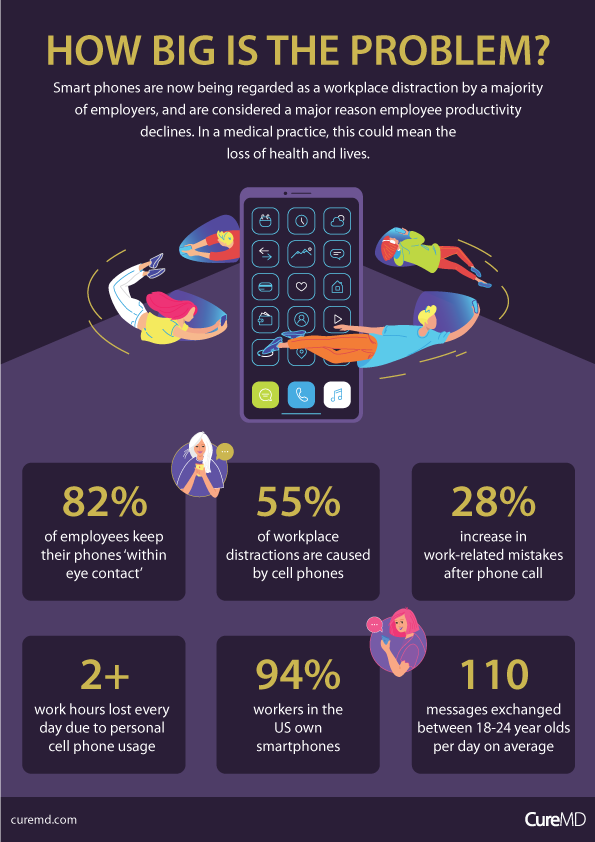In 2011, an attending at a hospital ordered a prescription for a PEG tube replacement. Just as the resident was about to enter the prescription into the Computerized Physician Order Entry System (CPOE), she received a text message from a friend.
On day four, the patient suddenly required an emergency open-heart surgery.
The resident had forgotten to enter the order.
Excessive Cell Phone Usage Can Impact Your Practice
With cellphones increasingly becoming a part of the modern-day work life, many providers are worried that they are distracting staff and hampering productivity. Research reveals that over 50% of employers believe cell phones are the main cause of declining staff performance. Incorporating emotional regulation techniques can help staff better manage distractions and maintain productivity in high-stress environments like medical practices.

Strategies to Curb Cellphone Usage
According to research, cell phone users between the ages of 18 and 24 exchange up to 110 text messages per day, and open or respond to a text message within 90 seconds of receiving it, which means millennial employees may exchange over 50 texts per day at the workplace. Another alarming finding is that not only are employees more likely to make work-related mistakes after a phone call or a text, but the rate of errors is the same even after merely hearing an alert on one’s phone. Because of this habit-forming nature of cellphones, practice owners must intervene when practice staff are refusing to put mobile devices away. While some providers are reluctant to interfere in personal cellphone usage, the problem should be given the same importance as any other disciplinary issues.
Following are some strategies to control cellphone usage in your practice to ensure that the staff is focused on patient care.
Accept Cellphones as Part of Work Life
Cell phones are here to stay. Although an environment without cellphones may be the ideal workspace, it is no longer realistic to expect this. Research reveals that over 94% Americans own a smart phone, which means that they have become part of our daily life. While work always comes first in a medical practice, personal devices are important for people to stay in touch with their families and attend to personal affairs.
For More Information: Patient Satisfaction: The Most Significant Factor in Ensuring Practice Growth
Banning cell phones in a medical practice can be seen as harsh and potentially lead to lack of motivation. Blocking cellular signals is also not viable, since this hinders business communication. Even though a medical practice demands deep focus from employees, it is essential for employers to accept cell phones as a part of work life and put acceptable usage policies in place.
Set Usage Limits
It is advised to introduce limits on cell phone usage according to the nature of your practice. For example, cell phone use can be prohibited in the following circumstances:
- During meetings, training sessions and conferences
- When interacting with patients
- In the presence of patients, for example, in the waiting room
- In between pending work tasks, like collecting labs, entering information into charts, scheduling appointments, etc.
Your cell phone policy can also define:
- Timings when it’s okay to use cell phones, for example, lunch breaks
- The permitted frequency and length of calls
- Keeping cell phones out of sight, such as in drawers or lockers
- Appropriate use, like brief calls or texts with family members
- Prohibition of unnecessary usage, like playing games or listening to music
In addition, define cell phone etiquette, since calls can be annoying to people sitting close to the talker, especially in a medical practice. Make sure your policy mandates cell phones to be kept silent, users to speak quietly on calls, and to strictly avoid any and all camera usage within the practice.
Roll Out a Written Usage Policy
To ensure that your cell phone usage policy is properly understood and followed by your practice employees, formalize it by writing it down. List down the rules in clear, straightforward language, along with reasons for each policy. It is also important to include the consequences and the disciplinary action that will be taken in case of violation. You could, for example, follow a policy with verbal, written and final warnings respectively, eventually leading to termination in case the behavior isn’t corrected. Ensure your staff understands this and agrees with it by requiring individual signatures on the written policy terms.
Learn More: Best Way to Market Your Medical Practice for Free in 2020
Lead by Example
If you want your practice staff to change their cell phone habits, you must follow the policies and values that you wish to instill in your workplace. If you, as the practice owner or manager, are taking personal calls and spending time on your phone, your employees are also unlikely to comply. Be a good role model and exhibit the core value that healthcare is a serious business and needs to be taken as such.
Keep a Check
As a medical practitioner and a practice owner, it can be tedious to manage multiple roles. However, it is essential that you personally ensure that the rules are enforced. Simply making workplace rounds and verbally warning your staff on cellphone usage will reiterate the policy. On the contrary, this can also be perceived as micromanagement which can lead to employee resentment, so it needs to be practiced in moderation.
Take Action Against Violation
In a medical practice, staff failing to put their cell phones away can have serious health consequences for patients as well as the business’s reputation. In case an employee consistently ignores the policy, follow the process of issuing a verbal and written warning before issuing a final warning of termination, followed by the actual termination. These discussions must be documented and the consequences of the employee’s actions made clear to them regularly.
Read More: Horizontal Innovation and Healthcare: Order vs. Chaos
For a healthcare facility like an independent practice to truly thrive, perhaps the most important part is creating a team that is well-knit, dedicated, and committed to your cause – improving care coordination and optimizing patient experience. As a business owner and entrepreneur, it is therefore essential to remove the weak links, and to create a workplace culture that is not stringent but values professional ethics and productivity.
